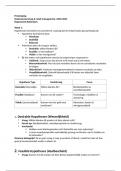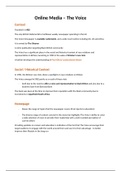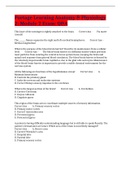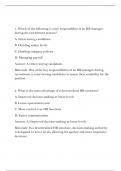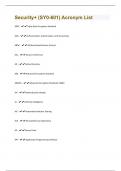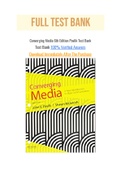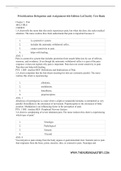WITH COMPLETE SOLUTIONS AND RATIONALES
What percentage of Americans speak a language other than English at home?
a) One in five
b) One in 10
c) One in 15
d) One in 20
Answer: a) One in five
Rationale: Around 20% of Americans speak a language other than English at home, making it a
significant portion of the population.
According to a report by the NIH and the CDC, health disparities are the result of:
a) Genetic predispositions
b) Wide variations in healthcare access
c) Cultural diversity among various groups
d) Racial and ethnic characteristics
Answer: b) Wide variations in healthcare access
Rationale: Health disparities are largely due to differences in access to quality healthcare
among various groups.
Which statement best describes nurses' use of terms like cultural humility, cultural
awareness, cultural sensitivity, and cultural competency? (Select all that apply)
a) The words all have the same meaning
b) The words have different meanings and can be confusing
c) Each term refers to some aspect of being culturally competent
Answer: b) The words have different meanings and can be confusing
c) Each term refers to some aspect of being culturally competent
Rationale: These terms have different meanings, but they all relate to being culturally aware
and providing competent care to diverse patients.
Which statement best illustrates what the nurse should consider when reflecting upon the
patient's context?
a) Social-political, historical, and structural situations impacting the patient
b) Folk and traditional health beliefs and attitudes
c) Preferences for western vs. eastern traditions
d) Employment and economic status of the patient
Answer: a) Social-political, historical, and structural situations impacting the patient
,Rationale: It is important for nurses to understand the broader context of a patient’s life,
including their social and political circumstances, as this influences healthcare.
Which statement below best describes a culturally competent nurse?
a) Having the motivation to provide quality care to assigned patients
b) Having the desire to partner or collaborate with the patient
c) Having the attitude, knowledge, and skills necessary to provide quality care to culturally
diverse patients and groups
d) Having the knowledge of multiple languages to address various patients' needs
Answer: c) Having the attitude, knowledge, and skills necessary to provide quality care to
culturally diverse patients and groups
Rationale: A culturally competent nurse possesses the necessary skills and knowledge to care
for patients from diverse cultural backgrounds.
A nurse selects a cultural assessment model when performing a nursing history of a newly
admitted recent immigrant from Cambodia. The primary reason for selecting the model is to:
a) Determine the nurse's ability to provide culturally competent care
b) Assess the patient's ability to communicate in English
c) Gain cultural knowledge about factors that may influence the patient's healthcare decision-
making
d) Determine the patient’s readiness to utilize western medicine
Answer: c) Gain cultural knowledge about factors that may influence the patient's healthcare
decision-making
Rationale: The goal of using a cultural assessment model is to better understand the patient's
cultural beliefs, which may impact their healthcare choices.
When using Purnell's 12 domains to perform a cultural assessment, the culturally
competent nurse understands that the term 'bicultural ecology' refers to:
a) Physical, biological, and physiological variations, such as skin color
b) Differences in geographic location
c) Attitudes toward preserving the environment
d) One’s country of origin
Answer: a) Physical, biological, and physiological variations, such as skin color
Rationale: Bicultural ecology refers to the physical and biological differences that are shaped by
the patient’s culture and environment.
When performing a cultural assessment, the nurse utilizes Giger and Davidhizar's
Transcultural Assessment Model. When assessing the construct of space, the nurse considers
the patient’s:
a) Visual depth perception
,b) The patient's comfort level regarding social distance
c) The adequacy of the patient's prior reception
d) The patient's sense of physiologic balance
Answer: b) The patient's comfort level regarding social distance
Rationale: The concept of space in the cultural assessment model refers to how much physical
distance the patient feels comfortable with during interactions.
In Leininger's Sunrise Model, 'generic or folk systems' refers to:
a) Western medicine
b) Systems of medicine that are antiquated and no longer useful
c) Health practices of the elderly
d) Traditional healthcare practices and belief systems used as alternatives to Western Medicine
Answer: d) Traditional healthcare practices and belief systems used as alternatives to Western
Medicine
Rationale: Folk systems refer to traditional health practices that are used in place of or
alongside modern healthcare systems.
The culturally competent nurse recognizes that the most appropriate time for performing a
cultural assessment is:
a) When obtaining health history
b) After the nurse has met with the patient and family
c) During each patient-nurse encounter
d) During the physical examination
Answer: c) During each patient-nurse encounter
Rationale: Cultural assessments should be an ongoing part of patient interactions to ensure
that care remains culturally appropriate.
The model that allows the nurse to express an understanding of how the patient feels
without necessarily conveying agreement is called:
a) The Sunrise model
b) PEARLS
c) Validation
d) The ESFT Model
Answer: c) Validation
Rationale: Validation involves acknowledging the patient’s feelings and experiences without
necessarily agreeing with them, fostering understanding and trust.
What is the main goal of cultural competency in nursing?
a) To be aware of different cultural customs
b) To provide care based on cultural beliefs and practices
, c) To learn new languages to communicate with patients
d) To make assumptions about the patient’s preferences
Answer: b) To provide care based on cultural beliefs and practices
Rationale: The primary goal of cultural competency is to provide care that respects and aligns
with the patient’s cultural beliefs and practices.
Which of the following is the most effective way for a nurse to provide culturally
competent care?
a) Assume that all patients share the same cultural beliefs
b) Provide care in a way that matches the patient’s preferences and values
c) Focus only on medical treatment and ignore cultural factors
d) Only interact with patients who speak English
Answer: b) Provide care in a way that matches the patient’s preferences and values
Rationale: Culturally competent care involves recognizing and adapting to the patient’s cultural
preferences, which ensures better care and trust.
Which cultural practice should the nurse be aware of when caring for a patient from a
Muslim background?
a) They may avoid certain foods like pork and alcohol
b) They prefer Western medicine over traditional treatments
c) They prefer to use herbal remedies rather than prescribed medications
d) They do not believe in physical touch during medical examinations
Answer: a) They may avoid certain foods like pork and alcohol
Rationale: Many Muslims avoid pork and alcohol as part of their religious beliefs. The nurse
should be mindful of this when providing care.
What should a nurse do if they are unsure about a patient's cultural beliefs or preferences?
a) Assume the patient follows the common practices in their country
b) Ask the patient directly about their cultural preferences
c) Consult with family members for guidance
d) Provide care based on general assumptions about their culture
Answer: b) Ask the patient directly about their cultural preferences
Rationale: It is essential to ask the patient directly about their preferences to provide care that
is respectful and appropriate for them.
When assessing a patient's cultural needs, it is important to consider their:
a) Age, gender, and education level
b) Religious beliefs, family structure, and language preferences
c) Previous medical conditions and treatments
d) Occupation and socioeconomic status

